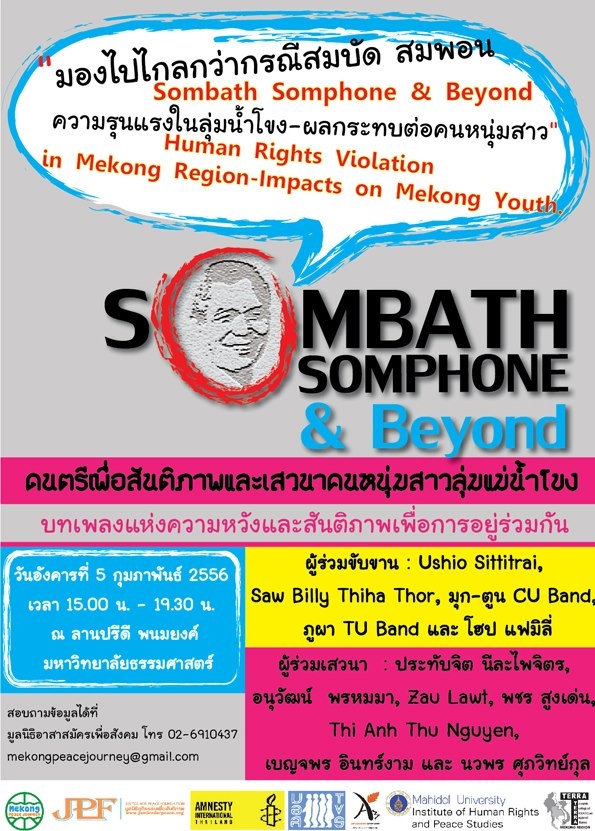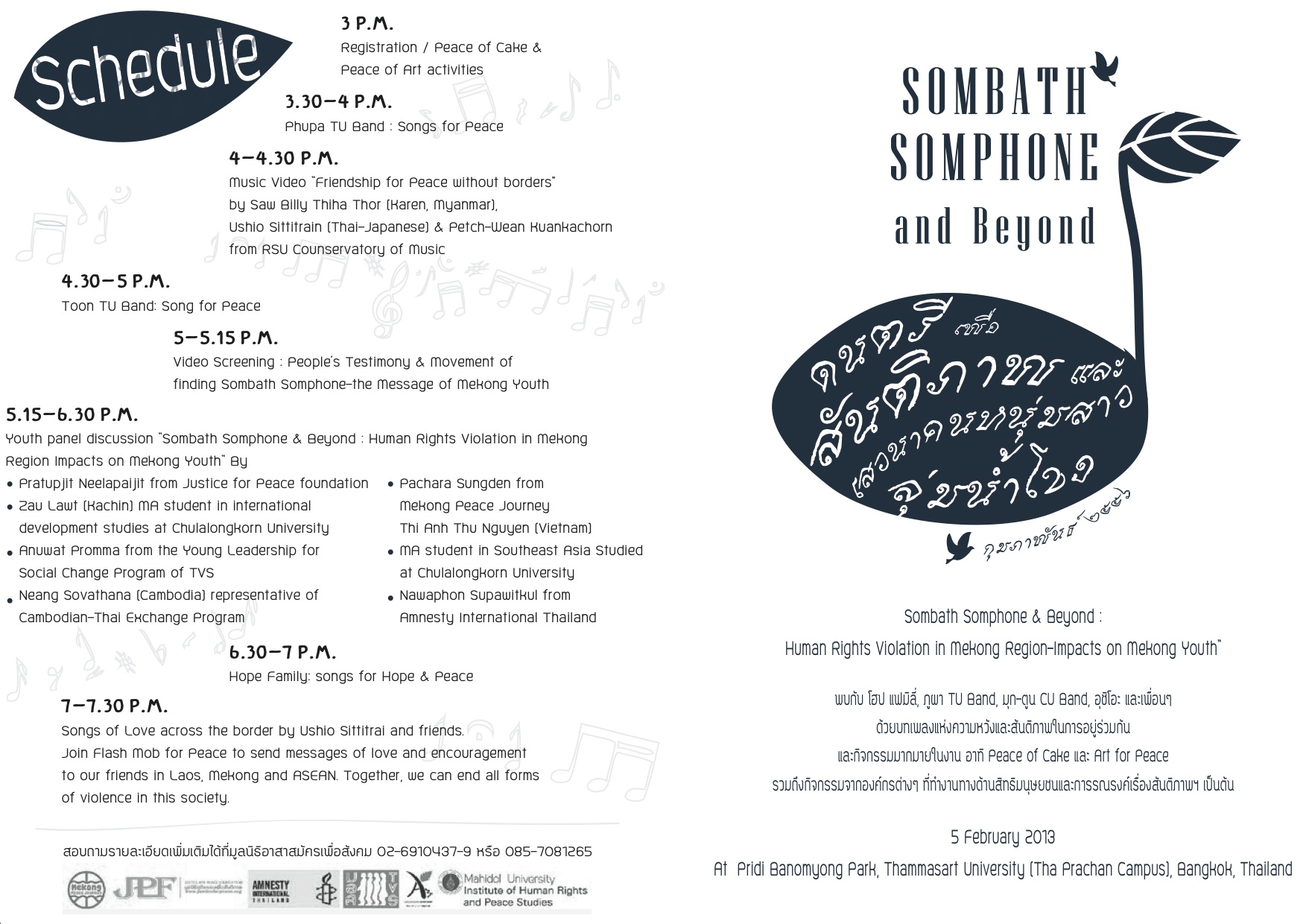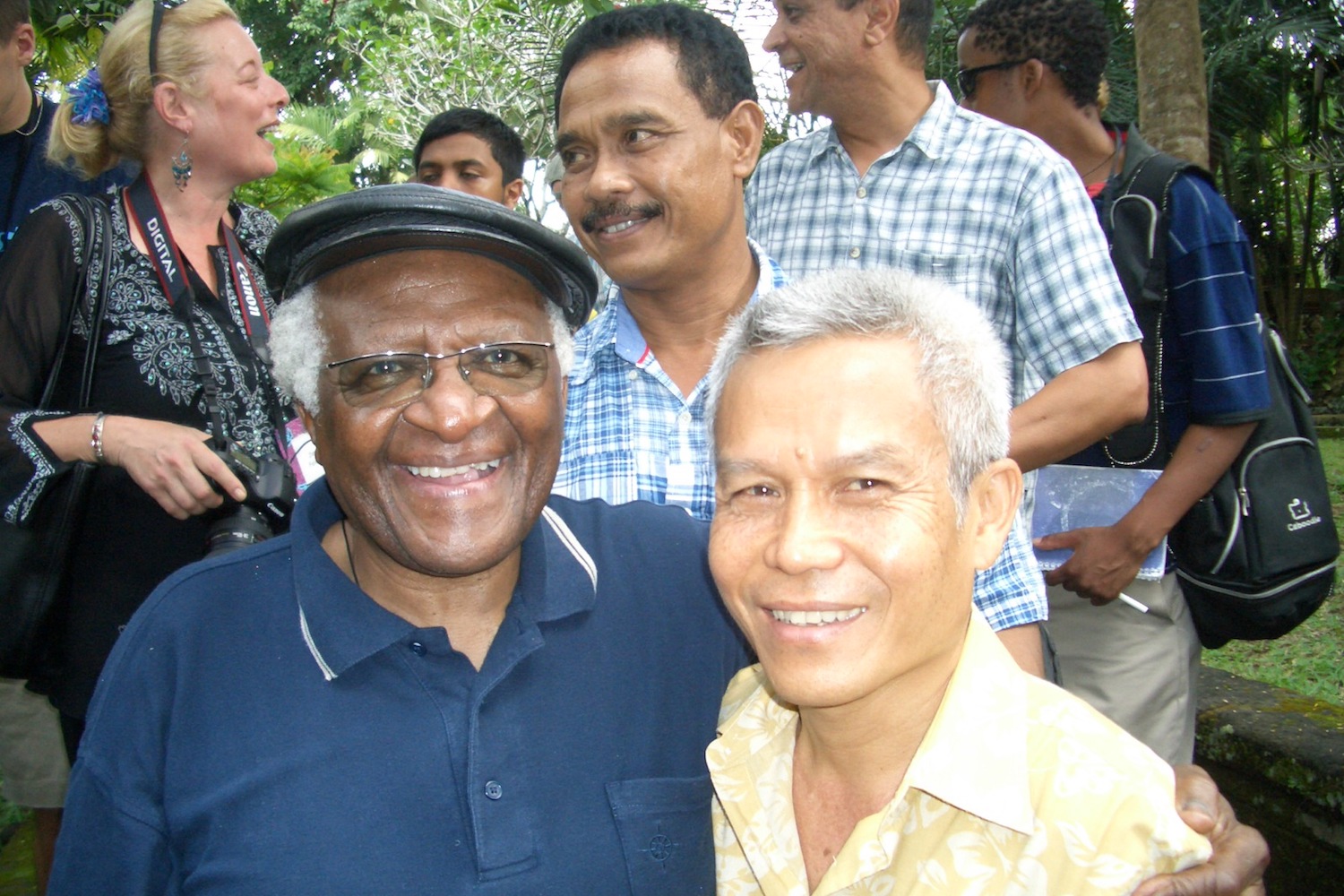(A Thai PBS news report on this event is available here.)
Music for Peace and Mekong Youth Discussion
Tuesday, February 5, 2013, 15.00-19.30pm
Pridi Banomyong Park, Thammasart University (Main campus)
 It has been a month and a half since December 15, 2012 when Sombath Somphone, a renowned Laos civil society leader went missing. Even with an important evident from street’s CCTV where Sombath was last seen in Vientiane, the Laos capital showing that he was stopped by the traffic police and being taken by a group of men, there is still no clear explanation of what really happened to him and where he is. The whole world keeps asking the same question, “Where is Sombath?” to the Laos government and the movement to ask for the safe return of Sombath has become the global action.
It has been a month and a half since December 15, 2012 when Sombath Somphone, a renowned Laos civil society leader went missing. Even with an important evident from street’s CCTV where Sombath was last seen in Vientiane, the Laos capital showing that he was stopped by the traffic police and being taken by a group of men, there is still no clear explanation of what really happened to him and where he is. The whole world keeps asking the same question, “Where is Sombath?” to the Laos government and the movement to ask for the safe return of Sombath has become the global action.
Sombath Somphone has been one of the key supporters to youth network, both in Laos and Mekong region. The human Rights violation to Sombath is therefore consider a major destructive matter that weakens not only the human rights standard of Mekong and ASEAN region, but also the future of youth movement. Yet, the similar human rights violation has still going on in the Mekong region. According to a report of Justice for Peace Foundation, there are more than 200 citizens went missing in relate to the conflict in three southern provinces of Thailand.With and without the report to the eye of public, such violation also going on in other Mekong countries in China, Burma, Laos, Cambodia and Vietnam in different forms.
The youth network believe that such violation to basic human’s right and humanity of people in our countries should be ended, and believe that everyone, especially the young generation, should take part in questioning and bringing significant change to create a more peaceful society for our better future.
On February 5, 2013, Thailand’s youth groups, NGOs and academic alliances, together with Mekong youth network will co-organize the Music for Peace and Mekong Youth Discussion under title “Sombath Somphone& Beyond: Human Rights Violation in the Mekong Region and Its Impacts on Mekong Youth” in Thammasart University (main campus). This event, combining between the youth discussion, music and exhibition by numbers of professional musicians and representative from Mekong youths,aims to bring the message of peace, love, and harmony among Mekong countries to the citizens of the region and to invigorate young Mekong peace-builders. The event also aims to collect the sign-on petition and messages that will be pass on to relevant groups for Sombath’s safely return. Let us work together to encourage our advocates, young and experienced, to overcome such fear and violence and create a real peaceful society for all.
For more information, please contact;
- Ms. Jaruwan Supholrai, Thai Volunteer Service Foundation
Tel: 08 1072 2714 Email: [email protected]
- Ms.Saksinee Emasiri, Institute of Human Rights and Peace Studies, Mahidol University,
Tel: 08 5212 1980 Email: [email protected]
 Introduction: “An effort to locate one woman’s missing husband has brought the Lao government unexpected international pressure, as the future of the country’s national image has been bound to Sombath Somphone’s disappearance and prospects for safe return. Analysts have even interpreted Sombath’s mysterious disappearance as a sign of the direction of political developments in the country. These international concerns are without doubt not good news a country which entered the WTO only two months ago.”
Introduction: “An effort to locate one woman’s missing husband has brought the Lao government unexpected international pressure, as the future of the country’s national image has been bound to Sombath Somphone’s disappearance and prospects for safe return. Analysts have even interpreted Sombath’s mysterious disappearance as a sign of the direction of political developments in the country. These international concerns are without doubt not good news a country which entered the WTO only two months ago.”




 In a one-hour meeting on Friday morning in Vientiane, senior European diplomats raised the issue with Laos’ Deputy Prime Minister and Foreign Minister Thongloun Sisoulith. “They also spoke for other like-minded countries – the United States, Switzerland, Japan and Singapore,” said a diplomatic source familiar with the meeting, known in diplomatic jargon as a démarche.
In a one-hour meeting on Friday morning in Vientiane, senior European diplomats raised the issue with Laos’ Deputy Prime Minister and Foreign Minister Thongloun Sisoulith. “They also spoke for other like-minded countries – the United States, Switzerland, Japan and Singapore,” said a diplomatic source familiar with the meeting, known in diplomatic jargon as a démarche.